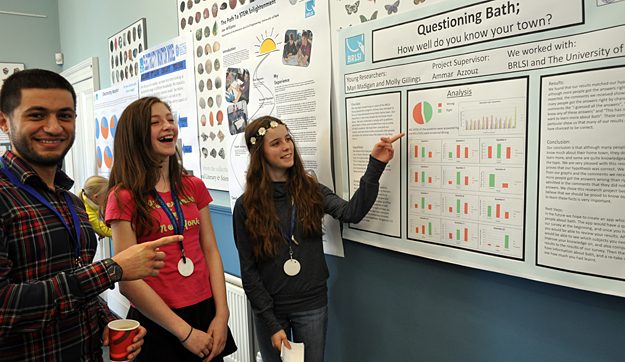Overview
Running between 2014 and 2019, Young Researchers was a mentoring programme developed and delivered in collaboration between Dr Paul Shepherd, Department of Architecture & Civil Engineering, University of Bath and the Bath Royal Scientific and Literary Institution (BRLSI).
Engagement category - Informing and Working Together
Public group - young people
Engagement methods - interactive talks, workshops, carrying out research, mentoring and creating posters and demonstrations
Themes - informal science learning, engaging with cultural organisations , building capacity for public engagement and public engagement leadership
Project team
Dr Paul Shepherd, Department of Architecture & Civil Engineering
Young Researchers co-lead Paul Thomas, Convener of Young BRLSI.
Young Researchers co-developers - Caroline Khun, PhD Student and Associate Lecturer, Department of Education, Bath Spa University and Dr Marie Huxtable, independent researcher in education
Facts and figures
The Young Researchers programme received £2,900 from the Public Engagement Unit in 2014 with ongoing annual expenses covered by BRLSI and the in-kind support such as venue hire from the project partners.
Motivations for engagement

Having been involved in a large number of public engagement activities over the years, Paul Shepherd’s main reason for this public engagement activity was to help support others to do public engagement for themselves. Through his engagement work Paul has gained a lot in terms of his confidence, presentation skills, profile and access to funding and he wanted to develop a project that supports doctoral students and early career researchers to begin their experience in public engagement and gain valuable transferable skills, such as communication skills, that will help them throughout their career.
Purpose of engagement

The project aimed to:
inspire young people with science, technology, engineering and maths research carried out at the University of Bath
raise awareness of the diversity of career routes into science, technology, engineering and math
foster a passion of science, technology, engineering and maths in young people
develop young people’s skills in scientific enquiry
develop a framework for the programme that enables young people to engage in meaningful research
develop doctoral students’ and early career researchers’ communication skills and skills in supervision
Project background

Young Researchers was part of Young BRLSI, an informal programme of events, workshops and activities for children, young people and families run by volunteers to help these groups develop their knowledge of Science, Technology, Engineering and Maths concepts and develop their skills of scientific enquiry.
Young Researchers was developed by Paul Shepherd and Paul Thomas responding to the needs of participants of the Young BRLSI programme to continue to pursue their interests in science and take part in ‘real-world’ science. Through facilitation during a matchmaking 'sandpit' event organised by the Public Engagement Unit in 2014, matching researchers with local community organisations, the project team secured funding to develop resources and deliver a pilot for Young Researchers in October 2014. Following the successful delivery of the pilot, the programme became part of Young BRLSI and ran annually until 2019.
Engagement approach

The Young Researchers programme was co-produced between Paul Shepherd and Paul Thomas, bringing together their expertise in working with young people in a cultural organisation at BRLSI and in informal science learning.
Between 2014 and 2019, Young Researchers took place annually for eight months between October and June. Each young person was paired with a mentor from a range of different departments from the University of Bath to develop and carry out a meaningful research project. Through this mentoring approach the young people learnt how to formulate and answer a research question by conducting a literature review, developing a method and performing experiments or carry out research.
Over the course of the eight sessions, that ran once a month on Saturday afternoons, the participating young people got to experience the research process first-hand and explore specific topics that were of personal interest. The young people took part in a range of activities including interactive hands-on activities introducing a range of scientific principles, working with their researcher mentor to devise a research question, visited labs and facilities at the University of Bath, carried out an investigation using real-world research techniques and shared their research at a local science festival. The programme culminated in a young peoples' conference where participants shared their research with their friends and families.
Evaluation
Using tools for participants to reflect on their experience such as a learning journal the following outcomes were identified for
Young people:
gained skills and confidence in presenting to large groups of people
felt more positive towards their own abilities carrying out research as researchers
developed research process skills of creativity, critical thinking, collaboration and communication
increased their knowledge of the process involved in carrying out scientific research
developed teamwork skills and formed positive relationships with other young people who are interested in science
enjoyed participating in the programme
Doctoral students and early career researchers:
gained practical skills in working with young people
developed their skills in academic supervision
enjoyed participating in the programme
developed their communication skills in explaining their research and research process to young people as a non-specialist group